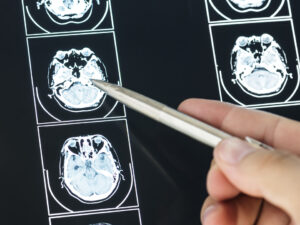
Ageing Well With Diabetes: A Simple Guide
June 8, 2022
Why Do You Feel Hungry So Often In Diabetes?
June 13, 2022Dementia is a general term used for diseases that impair the ability to remember, think or make decisions. There are many diseases that come under dementia, one of the most common being Alzheimer’s disease.
Dementia and diabetes are also closely associated. There are many reasons why diabetes leads to dementia. Let’s know more about dementia and its relation to diabetes in this article.
Dementia: Is It A Part Of Normal Ageing?
Many people assume that dementia is a part of normal ageing. However, it is not true. Normal ageing includes weakening of muscles and bones, stiffening of blood vessels and some age-related memory loss like forgetting the name of an acquaintance, forgetting recent events, etc. However, knowledge and experiences built over the years, languages and old memories remain intact while ageing.
Signs And Symptoms Of Dementia
The symptoms of dementia vary from person to person. However, in general, dementia tends to affect the memory, attention, communication skills, reasoning, judgement and problem-solving abilities of the person.
Some of the most common signs of dementia include:
- Getting lost in a known neighbourhood
- Referring to familiar objects with unusual words
- Forgetting the name of a close relative or friend
- Forgetting old memories
What Are The Most Common Types Of Dementia?

As discussed above, dementia is a general term used for diseases pertaining to memory loss. There are many diseases that come under this category, such as Alzheimer’s disease, vascular dementia, Lewy body dementia, frontotemporal dementia, etc.
Out of all these types, the most common type of dementia is Alzheimer’s disease, which is also vastly found in diabetes patients.
How Are Diabetes And Dementia Related?
Dementia is one of the most severe complications of diabetes. There are many reasons why type 2 diabetes may cause dementia. Some of these are mentioned below.
- Diabetes can cause high blood pressure levels and many heart diseases, such as strokes. As heart health is connected to brain health, these heart problems can lead to dementia.
- Diabetes tends to damage the small blood vessels in nerves and cells, including those of brain cells. This damage can cause dementia.
- People with diabetes tightly control their blood sugar levels to reduce the risk of heart disease and strokes. However, this tight control can sometimes lead to hypoglycemia, a common complication of diabetes. Hypoglycemia or low blood sugar levels, in turn, can damage the hippocampus or the memory centre of the brain and cause dementia.
How To Diagnose Dementia?

If you suffer from any signs and symptoms of dementia, contact your healthcare provider immediately. They will perform some tests on attention, memory, problem-solving, and other cognitive abilities to check the health of your brain. They may also prescribe blood tests and brain scans like CT or MRI to determine the cause of dementia.
How To Treat Dementia?
The treatment of dementia depends on the type of dementia the patient has. In the case of neurodegenerative dementia, such as Alzheimer’s disease, there is no cure. However, your doctor may prescribe medications to manage the symptoms and prevent further damage.
Nevertheless, the best way to treat dementia in diabetes is by controlling your blood sugar levels well.
How To Reduce Risk Of Dementia In Diabetes?
- Exercise every day, preferably aerobic exercises, for at least 30 minutes.
- Eat a healthy and balanced diet and maintain your blood sugar levels.
- Control cholesterol levels and maintain healthy body weight.
- Regulate your blood pressure levels.
- Quit smoking and restrict alcohol consumption.
- Keep a positive attitude.
- Engage in social activities.
- Learn new things and maintain a hobby like reading, writing or playing games.
On A Final Note
If you have diabetes, you are at an increased risk of dementia as high blood sugar levels tend to affect the functioning of the brain. However, if you keep your blood sugar levels under control and maintain a healthy social life, you can reduce your risk of dementia considerably.
References
- https://www.diabetes.co.uk/conditions/alzheimers-and-diabetes.html
- https://www.cdc.gov/aging/dementia/index.html
- https://www.alz.org/media/Documents/alzheimers-dementia-diabetes-cognitive-decline-ts.pdf
- https://www.health.harvard.edu/blog/whats-the-relationship-between-diabetes-and-dementia-202107122546
- https://alzheimer.ca/en/about-dementia/how-can-i-prevent-dementia/diabetes
- https://www.ncbi.nlm.nih.gov/pmc/articles/PMC6397437/
- https://pubmed.ncbi.nlm.nih.gov/31062329/
- https://www.knowdiabetes.org.uk/media/1166/hcp_dementia_trend_final.pdf
- https://www.thelancet.com/journals/landia/article/PIIS2213-8587(20)30267-9/fulltext
- https://www.health.harvard.edu/blog/want-to-travel-back-in-time-use-episodic-memory-2019091717793
- https://pubmed.ncbi.nlm.nih.gov/24745817/
- https://www.health.harvard.edu/blog/whats-good-for-the-heart-is-good-for-the-mind-2-2019061216812




